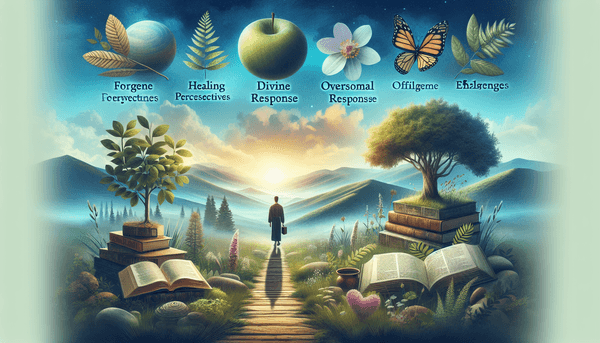The Clarity of Forgiveness
The act of forgiveness, as depicted in the Bible, is akin to the clarity that one might gain from improving vision, much like the bilberry's association with eye health. Forgiveness is not just a moral virtue but a catalyst for clear-sightedness, allowing us to see beyond the immediate pain and anger. Consider Ephesians 4:32, which implores us to be 'kind and compassionate to one another, forgiving each other, just as in Christ God forgave you.' This verse, along with others like Matthew 6:14-15 and Colossians 3:13, underscores the transformative power of forgiveness. By releasing resentment, we not only follow Christ's example but also protect our spiritual well-being, much like antioxidants safeguard our physical eyes from harm.
Healing from Breakups Through Faith
Enduring a breakup can evoke a storm of emotions, yet the Bible offers a refuge of hope and solace. 1 Peter 5:7 encourages us to 'Cast all your anxiety on him because he cares for you,' reminding us that God is a source of comfort in our times of heartache. Healing is a process that involves grieving and the support of loved ones. Scriptures such as Psalm 34:18 and Matthew 11:28-30 offer a reminder that God is close to the brokenhearted and provides rest for our souls. In these moments, leaning on faith and the promises of God, like those in Isaiah 41:10, can serve as the cornerstone of rebuilding and finding peace after heartbreak.
Productivity and Studying the Bible
Studying the Bible is a foundational practice for spiritual growth, requiring focus and diligence. 2 Timothy 2:15 tells us to 'Study to shew thyself approved unto God, a workman that needeth not to be ashamed, rightly dividing the word of truth.' Effective study habits include establishing a distraction-free environment and a routine that allows for regular reflection on the Word. Incorporating insights from biblical wisdom and literature can further enhance our understanding of scripture. Prayer for wisdom, as suggested in James 1:5, can also enhance understanding and retention of biblical teachings. By breaking down the scripture into manageable parts and meditating on them, as encouraged in Joshua 1:8, believers can cultivate a deeper relationship with God through His Word.
Overcoming Self-Doubt with Biblical Assurance
Self-doubt can be a crippling force, but the Bible offers powerful reassurance to those who struggle with uncertainty. Believers are reminded in James 1:6 to ask for wisdom without doubting, for 'he who doubts is like a wave of the sea, blown and tossed by the wind.' Drawing strength from scriptures like 2 Timothy 1:7, which speaks of a spirit 'of power, love, and a sound mind,' can empower individuals to overcome insecurities. Trusting in God's guidance, as Proverbs 3:5-6 advises, and embracing one's identity in Christ, can reinforce confidence and purpose. Remembering that 'I can do all things through Christ who strengthens me' (Philippians 4:13) can anchor us in faith and self-assurance.
FAQ
Q: What does the Bible say about forgiveness?
A: The Bible emphasizes forgiveness as a crucial aspect of Christian faith. Passages such as Ephesians 4:32, Matthew 6:14-15, and Colossians 3:13 teach that we should forgive others, just as God has forgiven us, to maintain healthy relationships and experience God's grace.
Q: What is the best way to get over a breakup?
A: The Bible suggests that during a breakup, it's important to grieve, seek the comfort of friends and family, and cast your anxieties on God as per 1 Peter 5:7. Taking time to process emotions and leaning on faith can aid in healing from heartbreak.
Q: How can I be more productive when studying the Bible?
A: To improve productivity in Bible study, create a conducive environment, establish a study routine, set specific goals, and break down material into smaller sections. Integrating prayer for wisdom, as encouraged in 2 Timothy 2:15, can also be beneficial.
Q: How do I cast my anxiety on God?
A: Casting anxiety on God involves trusting Him with our worries and burdens, as instructed in 1 Peter 5:7. It's a process of prayer, surrender, and faith in His care and provision.






